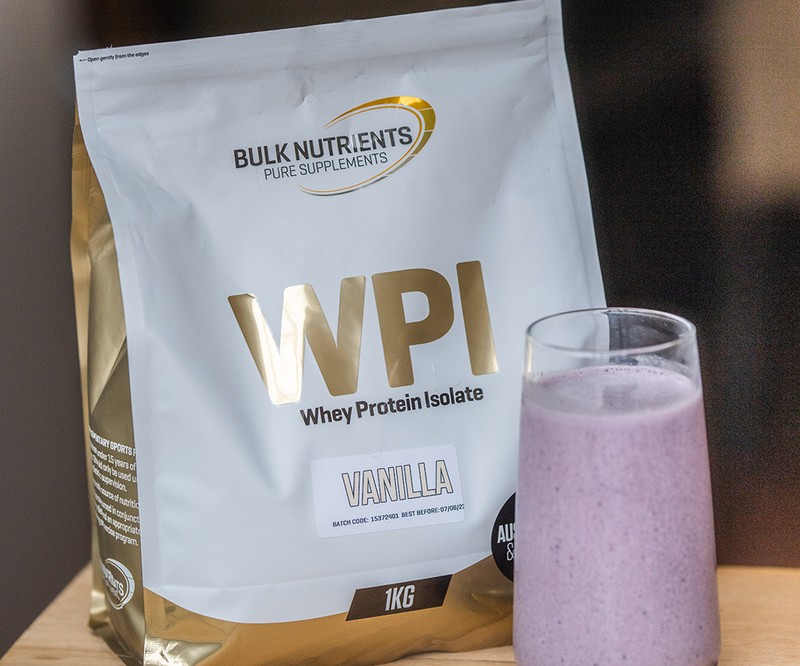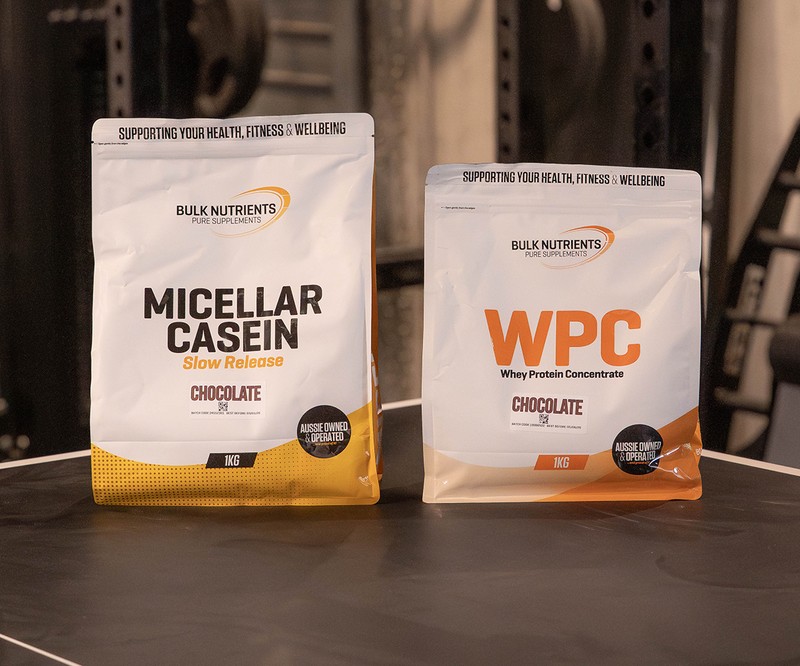How Fast Does My Protein Powder Digest?

Digestion rate of whey protein vs casein protein
You might hear frequently that whey protein is a fast-acting protein. And it is!
Research shows it digests at around 10 grams per hour. So, consume 30 grams from a Bulk Nutrients Whey protein variety and after 3 hours it's more or less been digested.
And casein protein, which is known to be a slow-acting protein, basically digests at half the speed of whey -- 6 grams per hour. Also, a quick fun fact whilst we're on the topic: milk is 80% casein and 20% whey.
So consume 30 grams of Bulk Nutrients Casein protein and it will have left your bloodstream after 5 hours!
And that's a rather significant difference.
But why is this important?
Well, if you're going for long periods without protein (not ideal), it's good to know how long you're covered with your respective choice of protein variety.
For some context, research suggests we don't want to go longer than four to six hours without protein intake, especially when we're resistance training frequently.
And this is true especially right after a bout of resistance exercise -- protein within 4-6 hours is ideal.
So, let's say you know you can't get to a protein source for up to 5 hours; casein makes for a great low-calorie option to ensure you're covered with amino acids for that time.

Casein can also prevent hunger in between meals and makes us less likely to want to indulge in anything too high in calories.
Casein before bed for optimal muscle growth?
One study looked at pre-bed casein ingestion whilst matching protein across the different groups. Previous research had simply compared casein protein to a control group, where the protein wasn't matched. Thus, we weren't any closer to a conclusion.
However, in the aforementioned and better-designed study, 13 untrained men consumed 70g of protein (82% casein) across two doses.
35 grams were consumed at 10:30 pm, and the other at 4 pm before their weight training. The other half of the protein was consumed at 10:00 am (between breakfast and lunch for each group).
Body composition was measured, as was maximal strength over two training blocks (one for each casein timing approach).
The men performed resistance training programs for 8 weeks, training 4 times per week with 3-4 sets per muscle group at 75-80% 1RM. The program was:
Monday and Thursday: Chest, back and shoulders.
Tuesday and Friday: Legs, back extensions and arms.
So, what did they find?
Body mass slightly increased (non-significantly) in both groups (0.7 kg for the casein-before-bed group and 0.8kg for the pre-training group).
However, gains in fat-free mass were better in the group consuming casein protein before bed than in the afternoon before training. Fat mass loss was insignificant.
So, casein before bed turned out to be beneficial here.
However, there are limitations to this study! Those in the night-time casein group were expected not to eat from 12 pm to 8 pm (which seems unlikely, surely, they had more protein in that period!) which may just explain the increase in muscles gained.
So really, we're still unsure.
But when we enter the world of common sense, we know one thing for sure: casein protein digests slower.

So, it seems plausible that consuming a casein shake before bed might just allow for more muscle gains, given it leaves us with elevated levels of amino acids for longer. But there are other things to consider:
Whey vs Casein for Muscle Growth
When we put whey and casein head-to-head, we see the following characteristics:
Whey Protein
Digests faster than casein, but with a larger stimulation of protein synthesis
Casein Protein
Digests slower than whey, but delivers a more sustained elevation in blood amino acid levels, and a larger inhibition of protein breakdown, but a smaller stimulation of protein synthesis.
So, whey stimulates muscle growth better than casein, but casein prevents breakdown better. So, we're beginning to see how they might be helpful allies here.
So, if casein prevents muscle protein breakdown, it may just be a good option before bed for muscle growth, despite more research being needed.
So, you have two choices before bed: tuck into your whey protein with some milk (80% casein!) or have a combination of whey and casein protein powder before bed. It certainly can't hurt until more research comes to light!
The bottom line is that whey protein, a fast-acting protein, digests at 10 grams per hour. Consume 30 grams from a whey protein shake and after 3 hours it's digested. Casein protein, a slow-acting protein, digests at half the speed of whey - 6 grams per hour. After 5 hours of consuming 30 grams of casein protein, you're back to baseline.
Ideally, we don't want to go without protein for more than 6 hours, so this information is handy to know depending on what we have on for the day. Also, the jury is still out on casein before bed, but at this stage, we'd still suggest it's a good strategy, as studies (despite their limitations) support it.
References:
- Aragon AA, Schoenfeld BJ. Nutrient timing revisited: is there a post-exercise anabolic window?. J Int Soc Sports Nutr. 2013;10(1):5. Published 2013 Jan 29. doi:10.1186/1550-2783-10-5
- Bilsborough S, Mann N. A review of issues of dietary protein intake in humans. Int J Sport Nutr Exerc Metab. 2006;16(2):129–152. doi: 10.1123/ijsnem.16.2.129.
- Boirie, Y., Dangin, M., Gachon, P., Vasson, M. P., Maubois, J. L., & Beaufrère, B. (1997). Slow and fast dietary proteins differently modulate postprandial protein accretion. Proceedings of the National Academy of Sciences of the United States of America, 94(26), 14930–14935.
- Burk, A., Timpmann, S., Medijainen, L., Vähi, M., & Oöpik, V. (2009). Time-divided ingestion pattern of casein-based protein supplement stimulates an increase in fat-free body mass during resistance training in young untrained men. Nutrition Research (New York, N.Y.), 29(6), 405–413.
- Davoodi SH, Shahbazi R, Esmaeili S, Sohrabvandi S, Mortazavian A, Jazayeri S, Taslimi A. Health-Related Aspects of Milk Proteins. Iran J Pharm Res. 2016 Summer;15(3):573-591. PMID: 27980594; PMCID: PMC5149046.
- McDonald, L. The Protein Book | Bodyrecomposition. (2007). Retrieved from http://www.bodyrecomposition.com/the-protein-book/
Related Blogs

What is Whey Protein?
Posted by Ben Crowley
Estimated reading time: 10 minutes

Whey Protein vs Casein Protein: Which One Should I Choose?
Posted by Bulk Nutrients
Estimated reading time: 5 minutes

Casein vs Whey: Which Protein is Right for You?
Posted by Bulk Nutrients
Estimated reading time: 5 minutes















































